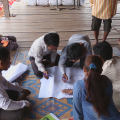Podcast – How can researchers work together with media: Some key principles from a young Vietnam journalist
Researchers work to produce scientific findings on complex environmental topics. Often, they need the media to disseminate their findings to the policymakers and the public. How can researchers work together with the media? Listen to our podcast to learn some of the key principles from the viewpoint of a journalist, Ms. My Le, who worked with SUMERNET researchers in the Mekong Delta to produce a story about climate change and water management in the delta’s wetlands.
SUMERNET researchers work to co-produce knowledge that can help address the many environmental and development challenges in the Mekong Region ranging from climate change and ecosystem degradation to inequality and poverty. But researchers often lack the capacity, networks, or connections to communicate their findings to non-academic audiences.
Hence for SUMERNET, the media, especially journalists in the Mekong Region, have been a critical partner in helping disseminate the research to the policymakers and public. The media also plays a huge role in shaping public perspectives and policy agendas on key environmental discourses in the Mekong Region such as the role of upstream dams in the Mekong River’s floods and droughts, forest conservation, and air pollution.
Aware of the importance of regional media in the region, SUMERNET has, over the years, collaborated with journalists and editors through seminars, workshops, trainings, and supporting media-research grants.
For this podcast episode, we talked with Ms. My Le, a young journalist from Vietnam who received a SUMERNET media-research partnership grant to work with SUMERNET researchers and produce environmental stories.
My Le wrote about the challenges for local communities in U Minh Thuong in Kiên Giang province in the Mekong Delta region of Vietnam. The vagaries of climate change is affecting the area’s water resources and local water management.
She admits that when she visited the place, which is a wetland site, she was puzzled about why there was water scarcity: “When I visited the place, I saw water everywhere, and I didn't understand why there should be a shortage of water in the near future.”
But as she spent time with the researchers and met and talked with the local communities, things started to fall into place.
“Months after months, I followed the researchers. I talked to them, and I gradually understand the importance of their work.
“For me, I think the most valuable lesson that I learned from the partnership [with the researchers’ is that when we talk about water security, we must first talk about the security in people's minds such as the residents of U Minh Thuong.”
Knowing the role of the media
My Le thinks that researchers find it more difficult to collaborate when they are not familiar with media and how journalists work, such as needing interviews and data, or of the important role that media play in helping scientists.
“From my perspective, [for] the scientists who are familiar with media, those scientists will usually work or collaborate very closely with the media. But for those who don’t quite understand the importance of media for their work, they just like shut the door. I think that's one of the challenges that I faced.
“In this partnership with the Wetlands Research Group, when we interviewed Dr. Ni, for example, he was very open. He talked a lot, and he explained everything. When we talked to his teammates, some younger researchers, for example, you know the conversation didn't go smoothly.”
Collaborating for policy action
Policymakers are an important component for SUMERNET projects as the scientific outputs are aimed at policymakers to make them understand what policies are relevant or which ones need to be revisited or improved. In this process of policy outreach, the media plays an extremely important role to bridge the gap between science and policymakers. How can the media be a better actor in this process? How can the media help to get scientific information to policymakers?
In My Le’s view, the researchers can’t do it alone, they need the journalists, and vice versa: “We should think about the collaboration between the media and research as a team; we are on the same boat."
"And that's why the researchers and the media should do [work] together. To bridge science and policy, there should be communication strategies, not just one-time articles. Researchers should actively follow up with media events such as press conferences."
“I believe that there should be various formats to present a story because people have different tastes in the platform that they like to have a look at. And especially if we want the story to reach policymakers, who are usually busy, I think we should choose the shortest means of communication, like putting it into a one-minute video, for example.”
Episode host: Rajesh Daniel
Sound editing: Rajesh Daniel and Variya Plungwatana
Series producers: Rajesh Daniel and Variya Plungwatana
Download the transcript using the link below. Links for additional resources and reading are also included in the transcript.
Listen to this episode on available channels:
Info
This story is part of the following project
SUMERNET 4 All: Engaging with water insecurity in the Mekong Region
Topic
Country
Related people
You might be interested in
-
SUMERNET Vision Guide introducing the new phase "SUMERNET 4 All"
The new, revised "Vision Guide" for SUMERNET is now available. This vision guide presents an overview of SUMERNET - its origins and governance structure, background to the network, aims, key research areas, engagement with policy, and outreach products
![SUMERNET Vision Guide introducing the new phase "SUMERNET 4 All"]()
-
SUMERNET 4 All Call for Proposals on Joint Action
SUMERNET 4 All (S4A) provides financial support and technical assistance to consortia of researchers and boundary partners from the Mekong Region
![SUMERNET 4 All Call for Proposals on Joint Action]()
-
SUMERNET launches redesigned website to provide a fresh visual look and direction
SUMERNET is proud to announce the launch of our redesigned website to coincide with our new phase of work on addressing water insecurity in the Mekong Region.
![SUMERNET launches redesigned website to provide a fresh visual look and direction]()
 By
By 





 Read more about SUMERNET
Read more about SUMERNET
